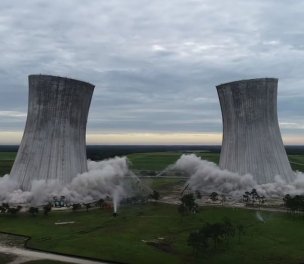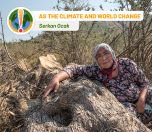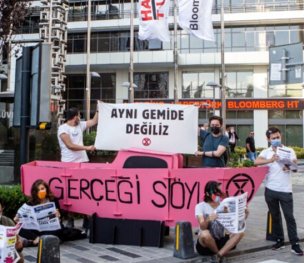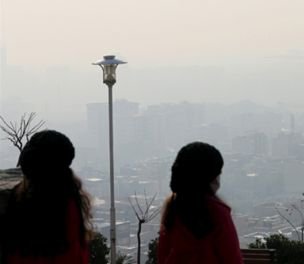* Credit: US Coast Guard
Click to read the article in Turkish / Kurdish
While Karl Marx was working for the Rheinische Zeitung newspaper as a liberal democrat, under the influence of Hegel, he used to believe in the idea that the state was supra-class. He thought that a democratic state with universal suffrage, together with economic progress, would provide the humanity with prosperity.
However, an incident he witnessed was going to change his whole life and even the destiny of the whole world. A timber law was passed in Germany. The landowners who owned the forests ensured that peasants collecting wood from their forests for heating and cooking would be punished.
People who had a relationship with the forest because of their need and who lived in harmony with it became a national security issue. The security of the landowners' property was now a matter of national security. Because theft was unacceptable! However, poverty was not a security problem.
Becoming a security threat
When Marx saw the impact of this law (the right to ownership of forests) on the poor majority of society, he began to question the ideal of the state he had believed in until then. He was just 24 years old, then. He was no longer a favorite of the newspaper because of the five objection articles he wrote. He was now a security threat and experienced censorship and detention. Just two years later, he was going to say "nature is the inorganic body of man" in his Economic and Philosophical Manuscripts.
He said that thanks to the relationship that they established with nature, human beings, who are a part of nature, meet their needs for food, warmth, shelter, and so on. They were part of nature, but they had an effect on it, too. Later, he was going to explain human alienation from nature and its consequences with the concept of metabolic cleavage.
In summary, after what Marx witnessed in his own time, he began to radicalize towards the idea of "change the system, not the state".
Today, a very young generation is going through a similar process of radicalization while struggling against climate change and they can be perceived as a security threat from the system's perspective.
The commons and security
About 100 years after these conceptualizations, a new discussion started over nature, property, and security. In 1968, Garret Hardin's article The Tragedy of the Commons sparked this new debate.
Hardin claimed that the commons, which do not become a part of any property relations - neither private nor public - such as forests, meadows, waters, lakes, and similar assets, would inevitably perish if they were not included in property relations.
He said that seeing these beings as commons would result in tragedy. There were three reasons that led the commons to be ruined, namely the overuse due to competition (he describes this with his famous example of farmers grazing sheep in the meadow), pollution, and population growth.
Hardin was, therefore, openly advocating enclosure, but it was not necessarily private property. It could also be a state property that takes its title deed and regulates its use and operation.
He explained that a mutually agreed coercion was required to manage these areas. So, Hardin made the management and protection of natural assets a matter of security, by incorporating a property relationship.

Objections
David Harvey is one of the Marxists who objects to Hardin's conceptualization. In Rebel Cities, he starts his objection with a crucial determination. This determination provides us with an important starting point while responding to the securitarian arguments of today.
In the example of the meadow, Hardin says that the pasture will dry out over time, and the sheep owners will suffer because of the competition in which each sheep owner wants to graze more sheep.
According to Harvey, the basis of the problem is not the joint use of the meadow but the ownership of the sheep and the necessity of raising the herd under competitive conditions. In other words, the basis of the problem is the development of the livestock industry.
Fifty years after Hardin, we do not know how many commons not involved in property relations have remained today. However, the last commons are on the way to extinction as a result of climate change.
The last commons we have
The Amazons turned Hardin's example into a reality, but in a different way. Forests are being burned to clear the fields. Brazil's President Jair Bolsonaro, on the other hand, is able to say, "It is absurd to say that the Amazons are the legacy of humanity, that our forests are the 'lungs of the world.' Believing in these lies and tricks means questioning our sovereignty."
Of course, the locals who defend their forests are considered a security issue, too. After the commons are burned, it turns into a usable property. So, the enclosure causes a great tragedy in this example.
It has been a long introduction. Let me come to our topic. In summary, I have tried to explain that the perception of the ecological crisis as a security issue arises due to the inclusion, in other words, the commodification of nature - whether private or state - into property relations.
Under capitalism, the system of "accumulation for accumulation, production for production", as Marx defines it in Capital, everyone and everything that has the risk of preventing capital accumulation becomes a security risk. Now, we can look at how the climate crisis has turned into a security crisis in the eyes of the rulers when the fight over natural resources has increased, and there have remained almost no new areas to spread over.
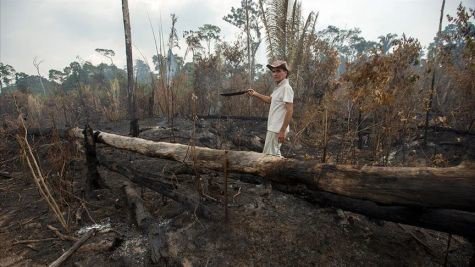
* Photo: AA
Socio-ecological dimension of climate change, security
Climate crisis is causing social and ecological changes by having direct and indirect effects on countries. States perceive these changes as security problems. Directly, it increases the severity and frequency of 'natural' disasters such as sea-level rise, excessive rainfall, floods, drought, hurricanes, etc. We are talking about the direct impacts on countries. In this case, threatening the lives of millions and forcing them to migrate becomes a national security problem.
According to research published in March, humidity and temperature in tropical areas, where 40 percent of the world population live, are rising to a level where people cannot live. Scientists announced that due to climate change, these regions are going to become completely uninhabitable.
For the countries in this geography, this situation has inevitably become a matter of existence. The countries facing the threat of extinction see climate change as a security issue. Hunger, diseases, unemployment, and immigration are inevitable consequences awaiting these countries. Other countries, on the other hand, see the immigrants of these countries as a security issue.
One of the last examples of the rise of a security issue due to the direct impact of climate change occurred in India in recent months. In the state of Uttarakhand in the Western Himalayas, dozens of people died, and up to 200 people were affected because of the glacier breaking off that destroyed the dam and triggered a massive flood. Villages were evacuated.
Previously, scientists had said that the glaciers in the Himalayas had melted radically in the last year. Just two weeks before the incident, the United Nations (UN) had warned that the old dams were not ready for possible catastrophes of global warming.
In the countries experiencing such incidents, we see problems such as unemployment, immigration, and rebellion. However, the action comes only after the rebellion. Of course, this action takes place through securitarian practices.
Migration as a security issue
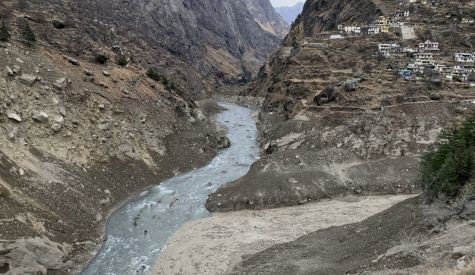
When we say the indirect socio-ecological effects of climate change, we mean the impact of the problems in one country on other countries. This indirect effect is usually migration.
The escape of the great masses from the effects of the ecological crisis is perceived as a security problem in the countries they go to.
According to the report, Climate Change, Migration and Displacement published by the United Nations Development Program (UNDP) and the Overseas Development Institute, 200 million people will have to leave their habitats and migrate due to climate change by 2050.
According to the 2018 report of the International Organization for Migration (IOM), an average of 25.3 million people have been displaced every year since 2008 due to the disasters. As a result of these disasters, immigrants spread to 118 countries.
If we compare the number of immigrants who went to 37 countries because of conflict and violence, it can be seen that the situation concerns almost all countries.
In 2016, the number of migrants who migrated because of disasters such as floods and storms were 23.5 million, which accounts for 97 percent of the 24.2 million migrants in total
Syrian civil war
We experienced the most serious example of the immigration and security problem with the Syrian civil war. Various publications have appeared on the role of drought in the civil war. [1] The historical drought between 2006-2010 was shown among the reasons for conflict. In just a few years, 1-1.5 million people had migrated from villages to cities and created the urban poor.
These masses had actively participated in the demonstrations when the revolution started. The civil war led to the emergence of ISIS as a global security issue with the help of ISIS attacks in Europe.
In addition, the migration of millions of Syrians was perceived as a "security problem" in the Western world. However, when we consider the possible effects of climate change, it is possible to read the Syrian civil war and its aftermath as a starting point.
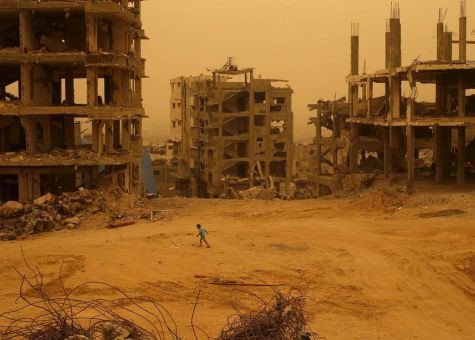
Water conflict cycle
In the The Intergovernmental Panel on Climate Change (IPCC) 1.5 Degree Special Report published by the IPCC in October 2018, it is stated that an increase in temperature by 1 degree or more increases the frequency of conflict between groups by 14 percent. One of the interesting studies on conflict and drought was the graph of the water conflict cycle that Marcus King revealed by examining the conflicts in Syria, Iraq, Nigeria, and Somalia.
Accordingly, in each instance, water stress factors such as temperature rise, water scarcity, extreme weather conditions, and groundwater depletion weaken the states. As a result of these stress factors, food production decreases, and farmers have to migrate massively.
During and after this migration, they become the victims of armed groups. At the same time, they can create the human resources of these groups. Of course, we should add state violence which they encounter at the borders. King also discusses how armed organizations such as ISIS, Al-Shabaab, and Boko Haram use water as a weapon.
Climate change's impact on militarism
The direct impact of climate change on the military is among the top national security problems of states. Moreover, even the climate-denier governments are extremely realistic when it comes to military competition.
It is known that the military of the United States (US) has prepared reports on the impact of climate change on national security since the 1980s. But there are no plans that go back that far to reduce carbon emissions. A 2019 report prepared for the US Department of Defense describes the effects of climate change on the US bases and operations.
For example, it is stated that the US naval base on the island of Guam in the Pacific Ocean was adversely affected by rising sea levels, and the telecommunications and infrastructure required for submarine and other naval operations were damaged.
This report stated that military areas such as Vandenberg Air Base in the western regions of the US were affected by the increasing number and intensity of fires, and Tyndall Air Base in Florida by the hurricanes.
Immediately after Biden was elected President, the US Department of Defense announced that it allocated a 67 million USD fund for 2021 to be used in military facilities to mitigate or repair climate-related damage.
We should make a note here. Donald Trump, the former US President, a climate denialist, had rejected reports from security agencies that involve climate change. But this did not prevent the army from making realistic analyzes because it was a "national security" issue.
They had found different ways to persuade Trump. The report prepared by the Ministry of Defense at the beginning of 2019 addressed the damages in 9 military facilities due to drought, floods, fires, and storms.
Of course, such reports are not limited to the US military. There is even a global platform called the Global Military Advisory Council on Climate Change (GMACCC), formed by retired and active officers in 2009 to draw attention to the security problems created by climate change.
.jpg)
* Photo: BBC
Military activity in the Arctic
We can see the direct impact of global climate change on military competition through the increasing military activities of Russia in the last few months. This time, developments are observable in the mainstream media, not in the reports.
President of Russia Vladimir Putin has started intense naval and military exercise activities in the Arctic region. The temperature rise in the Arctic region is twice as high as in the rest of the world. Now, less ice is formed in winter, and the ice layer formed is thinner. For this reason, while merchant ships and navies cannot navigate the Arctic in winter, ship fleets can now advance in the region under the leadership of icebreakers.
Moreover, it is estimated that approximately 22 percent of the world's undiscovered oil and natural gas is in the Arctic region. Russia took action in October following these developments.
The following news appeared on the Sputnik news site:
"The fulfillment of the main tasks of infrastructure development in the Arctic region achieved by the implementation of the following measures: Construction of at least five nuclear icebreakers suitable for all purposes, three 'Leader' nuclear icebreakers, 16 search and rescue ships with different capacities, three hydrographic and two buoys."
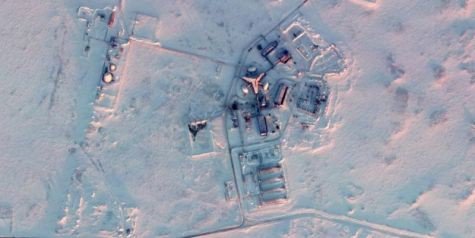
The natural defense line is vanishing
In February, Russia's state-owned nuclear company Rosatom released the video of the Christophe de Margerie tanker, which was pioneered by an icebreaker in winter for the first time along the route called the North Sea Route.
This route may halve the Asia-Europe transportation route that cargo ships follow through the Suez Canal. Shortly after the release of this video, Putin announced at the meeting of the "Board of Trustees of the Russian Geographical Society" that his country has been establishing the world's most powerful icebreaker fleet.
With the melting of the ice, Russia is increasing its search to find more fossil fuels in the region. It is looking not only in the sea areas where the ice is vanishing but also in the emerging new lands. Who owns these lands is a problem in itself. For example, at the end of 2019, Russia announced that five small islands emerged from melting glaciers.
The US officials say that Russia is building new military bases on its northern border with the increase in the melting rate of the glaciers. The purpose of these bases is to effectively control the more distant regions of the Arctic, which will melt soon. Of course, Russia is concerned that the melting of the glaciers is taking away the natural defenses of its north.
A report prepared by the UN Security Council in 2019 on climate change and security gave space to all these troubling developments. The report stated that climate change should be addressed as an urgent problem in terms of protecting international peace and security.
Climate activism as a security issue
One of the inevitable consequences of climate change was the emergence of a movement that wanted to stop climate change. However, climate activism has not been able to escape being perceived as a national security problem, as was the case with the labor movement or the civil rights movement.
As the climate, environment, and vegan movements rise, concepts such as eco-terrorism started to be used by the companies, conservative groups, and the far right and occasionally used in courts, too. Even books were written on this subject in the 2000s. Ron Arnold's EcoTerror: The Violent Agenda to Save Nature is one of the best known.
The common point of these and similar books and articles is that they defend the immunity of private property. They accuse protests against farms, dams, and mines of violence and terrorism. By doing so, they highlight extremely few bomb attacks such as dam explosions.
They conceptualize peaceful actions that liberate animals in farms or slaughterhouses as terrorism, violence, and an attack on property rights.
On the other hand, it is obvious that the ones exposed to terrorist attacks are extinct species, indigenous peoples, peasants, and environmental activists trying to stop the plundering by exercising their democratic rights.
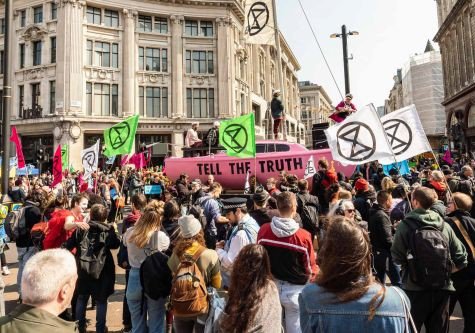
* Photo: Extinction Rebellion
Nazis and climate activists are on the same list
Extinction Rebellion was included among the extremist organizations that threaten national security (on the same list with groups such as armed organizations and Nazis) by the counter-terrorism police, just before the epidemic spread in England last year. Its justification was the following:
"This group embraces an anti-establishment philosophy, which underlies system change under its activism. It attracts school-age children and adults who are probably not even aware of it. While it is non-violent against individuals, the campaign encourages activities that violate other laws."
The far-right President of Brazil, Bolsonaro, blamed environmental activists when the most intense forest fires in Brazilian history occurred in the Amazon in the summer of 2019. In fact, Bolsonaro set up a conspiracy theory that could be called funny and said that the arsonists, whom the famous actor Leonardo DiCaprio paid for, started fires to put the country and the government in a difficult situation.
Also, the Environment Minister of Brazil claimed in October 2019 without showing any evidence that a Greenpeace ship caused the oil spill on the coast of Brazil. "In my opinion, this is an act of terrorism. Greenpeace, in my opinion, annoys us," he said.
About two months ago, climate activists supported the actions against the agrarian reform that dumped 250 million people to the streets in India. After Greta Thunberg shared a toolkit on how to support Indian farmers, Disha Ravi, one of the well-known young climate activists of the country, was arrested. Ravi had been sued for sending this toolkit to Greta and "starting an economic, social, cultural and regional war against India." Fridays for Future India's website was blocked for a while, too.
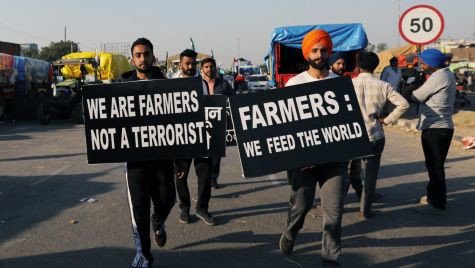
A call from scientists
In response to all these developments, in April, 429 academics and scientists from 32 countries published an open letter entitled "Stop criminalizing the non-violent climate protest." Scientists have called for an end to these worrying and anti-democratic practices against climate activism.
The scientists' call was to states, but activists are perceived as a security issue not only by the states. From time to time, they are directly targeted by companies and gangs "independently of governments."
For example, Francisco Vera, an 11-year-old climate and environmental activist from Colombia who took Greta Thunberg as an example received death threats. According to the Global Witness report, Colombia is the most dangerous country for activism because of the murder of 64 environmental activists in 2019.
Energy Transfer Partners has accused Greenpeace, Earth First, and other groups of referring to terrorist acts in a lawsuit against groups fighting against the DAPL pipeline project. It had revealed that Jeff Bezos, the CEO of Amazon company and the richest businessperson, also gathered intelligence about Greta Thunberg.
According to the leaked documents obtained by Vice, Amazon's Global Security Operations Center was tracking organizations and movements that it saw as a potential threat to the company's operations. Among the groups mentioned in these documents were Extinction Rebellion, Greenpeace, and Fridays for Future initiated by Greta Thunberg.
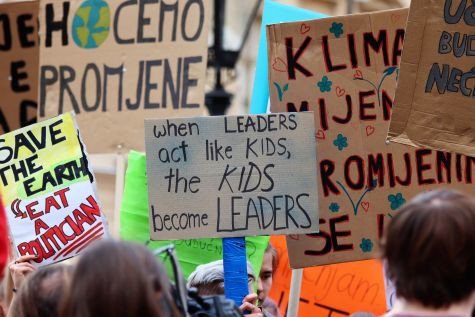
* Photo: Goran Horvat/ Pixabay
Instead of conclusion
Our planet is warming up fast. Climate crisis is deepening at a rate that will determine life, economy, and politics in all areas. Impacts of the 2008 global financial crisis have not yet passed. In other words, the profit rates expected to rise after an economic crisis have not risen. During the global economic recession, the climate crisis started to show its effects radically.
These two crises caused the collapse of the political center on a global scale. The world started to show signs of political crises such as riots, revolutions, civil wars, authoritarianism, and the rise of radical right. On top of all this, a pandemic crisis arose. The intertwined crises harden competition at the corporate level and the state level. The global capital group, which we call 1 percent, is on tenterhooks because of instability and competition.
There are constant riots all over the world. Millions of young climate activists, who have not yet reached the age of 18, go on strikes and take to the streets even during the novel coronavirus (COVID-19) pandemic. Strike by 250 million people in India, women's strikes on March 8, Extinction Rebels in London, Black Lives Matter in the US cities, Yellow Vests in France, anti-coups in Myanmar, and anti-monarchy in Thailand...
We are going through a radical period of change that is in constant contact with one another in the face of global problems and rises by connecting every problem with another. At the point where capitalism has no more promises, securitarian policies come to the fore. The slogan "either socialism or barbarism," which Rosa Luxemburg said amid a similar period of change, is updated by Noam Chomsky as "either internationalism or extinction." That is why states embrace the violence card. Protecting the global minority's property and capital accumulation is now very difficult.
A ghost roams every corner of the planet. It is the ghost of the crowds whispering "How dare you" against those who try to block the demand for change at the cost of billions of people's lives. Stopping it can be possible only through a large amount of pressure. If it can move forward, it will open the door to a new world. (ÖÖ/SO/EÜ/SD)
[1] de Châtel, Francesca (2014), "The Role of Drought and Climate Change in the Syrian Uprising: Untangling the Triggers of the Revolution", Middle Eastern Studies; Gleick, Peter H. (2014). "Water, Drought, Climate Change, and Conflict in Syria" American Meteorological Society. 6: 331-340
"As The Climate and World Change" article series*
Our life becomes history while we live! - Ömer Madra
1/ A country outside of the global climate policy: Turkey - Ebru Voyvoda
2/ Climate change, securitarian policies and ghosts - Özdeş Özbay
3/ Turkey's energy policy: Indigenous at home, Blue Homeland in the world - Emre İşeri
4/ The impact of climate crisis and fossil fuels on child health - Çiğdem Çağlayan & Funda Gacal
5/ We will see beautiful days, coal-free and sunny days-Elif Ünal
6 / Either capitalism or the future - Tuna Emren
7 / The three pillars of climate journalism: Science, politics, and social justice - Ece Baykal Fide
8 / Bringing science, struggle, and art together - Yasemin Ülgen
9 / Clean energy or betrayal? - Serkan Ocak
10 / It is time to say stop economic growth - Fikret Adaman & Gökçe Yeniev
11 / When climate refugees knock on our door - Mehmet Mücteba Göktaş
13 / Climate crisis affects women, women affect climate struggle - Merve Özçelik
14 / Climate fiction in literature- Buket Uzuner
15/ Dr. Faustus and children in the age of fire- Ömer Madra
* This series of articles is published with the financial support of Oslo Metropolitan University (OsloMet) Journalism & Media International Center.






